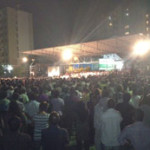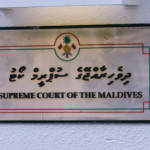Transparency Maldives’ Global Corruption Barometer (GCB) survey has revealed that 83 percent of people surveyed felt corruption had increased or stayed the same during the past two years.
The survey of 1,002 people – randomly selected and interviewed by telephone – showed respondents to perceive the People’s Majlis as the country’s most corrupt organisation, with 60 percent feeling the legislature to be ‘extremely corrupt’.
Religious organisations were perceived as the least corrupt organisation, with 37 percent of those asked stating definitively that these organisations were ‘not corrupt’.
Speaking at today’s launch event, President of the Anti-Corruption Commission Hussain Luthfy expressed concern at the indicators, noting a clear lack of trust in state institutions.
With local council elections fast approaching, Luthfy pointed out that a failure to reform local government could also be considered corruption.
“In the past five years, the governance system has been so expensive it has impacted the basic public services. Harbors and schools are falling into disrepair.”
Luthy suggested that the current model “bleeds” MVR800 million from the state’s expenditure each year – nearly five percent of the most recently proposed budget.
When submitting the 2014 budget – currently undergoing revisions – Finance Minister Abdulla Jihad urged the state to reduce the size of local level government.
The current model of more than 1,000 elected councillors established by the Decentralisation Act passed in 2010 by the then-opposition majority parliament was branded “economic sabotage” by the incumbent Maldivian Democratic Party (MDP) government, which had proposed limiting the number of councillors to “no more than 220.”
Luthfy went on to urge more transparency within government companies in order to foster an atmosphere in which corruption can be addressed proactively. He suggested that government owned companies often pass resolutions to obstruct the ACC’s investigations.
In a separate statement today, Luthfy argued said the biggest obstacle to the ACC’s fight against corruption was the absence of an anti-corruption bill. He called upon the Majlis – currently considering such a bill – to take the initiative in fighting corruption.
Education
Today’s GCB launch was accompanied by the introduction of a corruption education pack, including five booklets intended to spread awareness of corruption and its impacts on society.
Whilst the GCB figures showed a strong belief that ordinary people could make a difference in the campaign against corruption – with 84 percent agreeing to this statement – the results revealed a lack of will to take action.
Asked if they would be willing to sign a petition asking the government to do more to fight corruption, 86 percent of those surveyed said they wouldn’t. 70 percent said they would not take part in demonstrations against corruption, whilst 61 percent refused to even to raise awareness of corruption through social media.
The most common area in which bribes were paid was said to be land services, with the most frequent reason for giving bribes being ‘to speed things up’.
Earlier this week the ACC alleged corruption in the award of apartments to individuals as part of the Veshifahi Malé housing programme, ordering the invalidation of 139 of the 448 successful applications.
891 GCB respondents stated that they would report an incident of corruption, although only 3 percent admitted to having personally paid a bribe. 85 percent of those who admitted to being asked to pay a bribe said they had refused.
The sample of people interviewed were predomantly male (66 percent) and from urban settings (65 percent). One quarter of respondents worked in the public sector, with 63 percent described as earning a ‘medium’ scale income.
Transparency Maldives, the local chapter of Transparency International (TI)describes the GCB as one of the tools it uses to better understand corruption.
The group’s most widely used indicator – the Corruption Perceptions Index – was released last week. For the second consecutive year the Maldives was not ranked after TI was unable to gather the necessary data.






It's alarming people apparently perceive religious organisations as trustworthy while they are not. It means basically anyone can gain a big deal of credibility using a religious coat.
After politics, I believe religious institutions are among the most corrupt organisations in the world. If money and or power and influence is involved, corruption is not far away.
Was the Supreme Court excluded from this survey then?
Because it is more corrupt!
Funny, in all the other news websites, the news headlines read that People's Majilis was voted most corrupt place in Maldives.
On TV too, the headline was similar.
However Minivan News headline reads a different headline. Perhaps the writer doesnt want to convey the message of Corruption in the Majilis as a widespread occurence, or the fact that Majilis members that were voted for by the people turned out to be corrupt individuals serving only political parties and not the interests of the constituents that elected them.
Maldives without corruption…..? It must be someone’s wildest dream. Here it is absolutely morally and religiously OK to rip of anyone who you think is not Muslim or is not a religious person. When you can justify your wrong doing thorough your religious belief, and that belief is the purpose of your life, you can forget to make such people honest and rationale people. Here you can orchestrate anything for qaumattaka dheenattaka and it is absolutely OK to do anything for this purpose and there is nothing you can’t justify with this.
All the religions of the world have got the foundation on mockery, indecency, power-craving, materialistic needs,.. Etc.
The greatest corruption, deception for greed on earth are the devious schemes of few that's propagated through ages as this 'holy messages' that somehow got divine tabs on. 'I am the last', 'lots will challenge', covers one beautifully.
By those standards, Mordis is a corruption free.
when a regime is propped up through through undemocratic (kaalhu puppet Waheed regime), clandestine means; payout and other forms of corrupt means are the necessary means. Under which more clan mentality, nepotism and other forms of favouritism detached from the democratic, meritocratic norm would increase.
Yameen half brothers regime was devoid of such practices nor was Nasheed's; but with the 2008 transistion things did get a lot more transparent. Credit where credit is due, most of the institutions was established during Gayooms last days in office due to intense international and local pressure. So I cannot say how Yameen regime would fair in this index.